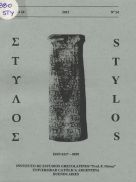Por favor, use este identificador para citar o enlazar este ítem:
https://repositorio.uca.edu.ar/handle/123456789/4268| Título: | Representación y conocimiento en Lucrecio | Autor: | Anchepe, Ignacio Miguel | Palabras clave: | Lucrecio, 99 a.C.-55 a.C.; Epicuro, 341-270 a. C.; FILOSOFIA GRIEGA; GNOSEOLOGIA; TRADUCCION; FILOSOFIA ROMANA | Fecha de publicación: | 2015 | Editorial: | Universidad Católica Argentina. Facultad de Filosofía y Letras. Instituto de estudios grecolatinos "Prof. F. Nóvoa" | Cita: | Anchepe, Ignacio. “Representación y conocimiento en Lucrecio” [en línea]. Stylos, 24 (2015). Disponible en: https://repositorio.uca.edu.ar/handle/123456789/4268 | Resumen: | Resumen: ¿Se limitó Lucrecio a la mera traducción de la filosofía de Epicuro? ¿O bien es posible identificar alguna tesis repensada por el filósofo romano? Los especialistas suelen interpretar la filosofía lucreciana como una simple trasposición conceptual. De hecho, a menudo se pretende compensar la escasez de la obra de Epicuro reponiendo las lagunas conceptuales con ideas lucrecianas. En el presente trabajo, empero, se prescindirá de esta presuposición hermenéutica. El propósito es analizar la noción lucreciana de simulacrum, en cuanto recepción del εíδωλον –imagen– de Epicuro. Se hará un análisis comparativo de algunos pasajes de Drn 4 y de la Epístola a Heródoto. Se sostendrá que, aunque los fragmentos de Epicuro sean breves, permiten inferir que Lucrecio, más que limitarse a una trasposición, introdujo significativas novedades en este concepto. Abstract: Was Lucretius a mere translator of Epicurus’ philosophy? Or is it possible to identify any thesis actively rethought by the Roman philosopher? The scholars usually interpret the Lucretian philosophy as a simple conceptual transposition. Indeed, it is often intended to compensate the scarcity of the Epicurus’ work by replenishing the missing concepts with lucretian ideas. In this paper, however, this assumption will be rejected. The aim is to analyze the lucretian notion of simulacrum, as reception of the Epicurus’ εíδωλον. A few passages of De rerum natura IV and of the “Epistle to Herodotus” will be comparatively analized. It will be argued that the fragments of Epicurus, although short, allow the inference that Lucretius introduced significant innovations in the concept of representation rather than just transposing ideas. |
URI: | https://repositorio.uca.edu.ar/handle/123456789/4268 | ISSN: | 0327-8859 | Disciplina: | FILOSOFIA | Derechos: | Acceso Abierto | Fuente: | Stylos, 24, 2015 |
| Aparece en las colecciones: | STY - 2015 nro. 24 |
Ficheros en este ítem:
| Fichero | Descripción | Tamaño | Formato | |
|---|---|---|---|---|
| representacion-conocimiento-lucrecio.pdf | 241,48 kB | Adobe PDF |  Visualizar/Abrir |
Visualizaciones de página(s)
246
comprobado en 30-abr-2024
Descarga(s)
449
comprobado en 30-abr-2024
Google ScholarTM
Ver en Google Scholar
Este ítem está sujeto a una Licencia Creative Commons

